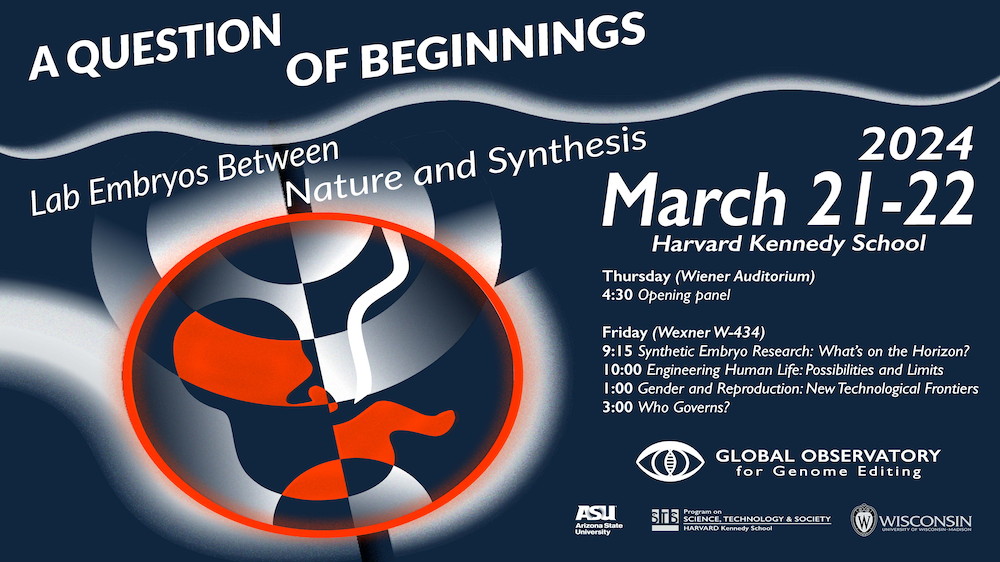A Question of Beginnings: Lab Embryos Between Nature and Synthesis

For more than 50 years, human ingenuity has created increasing distance between natural and technologically mediated human reproduction. As a result, the embryo, a site and object of technological innovation, has acquired a life of its own, outside the maternal body, capable of developing to some degree in laboratory or industrial settings. Concurrently, biologists and biotechnologists have synthesized embryo-like entities to probe human development and disease and constitute a wellspring of diagnostic and therapeutic products. What do these projects mean for human reproduction and corollary meanings of human integrity, rights, health and disease, and the nature of human relations– familial, legal, and social? The Global Observatory for Genome Editing explores these questions with a lecture and panels featuring conversations between leading scientists, ethicists, legal and policy scholars, religious thinkers and women’s rights advocates.
Thursday, March 21st
Location: Harvard Kennedy School Wiener Auditorium
4:30 A Question of Beginnings: Lab Embryos Between Nature and Synthesis
- Moderator: Sheila Jasanoff (Harvard Kennedy School)
- Jacob Hanna - Weizmann Institute of Science
- Nancy Gertner - Harvard Law School, Former US District Court Judge
- Carter Snead - University of Notre Dame Law School
- Arnold Eisen - Jewish Theological Seminary
Friday, March 22nd
Location: Harvard Kennedy School Wexner W-434 A.B. Conference Room
9:00 Welcome and Introductions
9:15 Synthetic Embryo Research: What’s on the Horizon?
- Jacob Hanna (Weizmann Institute of Science)
Reflections on the state-of-play and future frontiers of biomedical synthetic embryo research.
10:00 Panel 1: Engineering Human Life: Possibilities and Limits
- Moderator: Kris Saha (University of Wisconsin-Madison)
- Insoo Hyun (Museum of Science, Boston)
- Rudolf Jaenisch (Massachusetts Institute of Technology)
- Carrie Wolinetz (Lewis-Burke Associates, Former Senior Advisor at NIH)
How do scientists conceptualize biomedical engineering as it relates to human embryos and their development? What limits exist on these activities and where do ethical questions arise? This panel draws on perspectives from both scientists and bioethicists in this domain.
11:30 Lunch
1:00 Panel 2: Gender and Reproduction: New Technological Frontiers
- Moderator: Ben Hurlbut (Arizona State University)
- Judy Norsigian (Our Bodies, Ourselves)
- Elizabeth Bartholet (Harvard Law School, Emerita)
- David Albertini (Bedford Research Foundation)
What are the implications of synthetic embryo technologies for women and reproductive rights? How does the development of these entities affect notions of care, autonomy, and social obligation? This panel features reflection and discussion with experts on the women's health movement.
2:30 Coffee Break
3:00 Panel 3: Who Governs?
- Moderator: Sheila Jasanoff (Harvard Kennedy School)
- Jeff Hardin (University of Wisconsin - Madison)
- Ann Kiessling (Bedford Research Foundation)
- John Evans (UC-San Diego)
- Ben Hurlbut (Arizona State University)
Who is responsible for the governance of synthetic embryo technology and accountable for its impacts? What challenges do such technologies pose to transnational governance institutions and frameworks?
4:30 Reflections and Adjournment